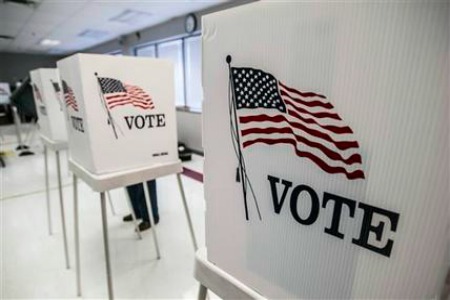
WASHINGTON (AP) — The midterm slugfest for control of the U.S. Senate could have far-reaching effects on the economy.
Tuesday’s elections come just as U.S. growth has been showing consistent improvement, thanks in part to a congressional truce on budget fights. Previous such fights shut down the government and raised the specter of a default on the federal debt. A repeat of either could quickly damage the economic recovery.
If Democrats retain control of the Senate, the cease-fire may hold, analysts say. But it’s possible it could dissolve with a takeover that gives Republicans control of both chambers and potentially emboldens them to intensify conflicts with a lame-duck Democratic White House.
Republicans already control the House and are expected to maintain and even expand their majority in that chamber.
Addressing the prospect of Republican leadership in both chambers, Jack Ablin, chief investment officer at BMO Private Bank, said, “My sense is it will only harden the tension that’s in place.”
On the other hand, Republican control would also raise the likelihood of other actions that could ultimately benefit the economy. Once in control, for example, Republicans could accept gridlock and pursue smaller deals on tax reform or trade authority with President Barack Obama. These deals could potentially benefit the economy in the long run, analysts note.
One possibility would be that a Republican majority would authorize Obama to complete trade negotiations for the Trans-Pacific Partnership to expand overseas markets for American-made products, which could help exports, said Corey Boles, a senior analyst with the Eurasia Group, a consulting firm.
Boles noted that tax reform “faces long odds in any Congress” but has a better chance of reaching Obama’s desk with a Republican Senate than with the currently divided Congress. Proposals to lower corporate tax rates, for instance, and allow companies to bring back profits from abroad without incurring significant taxes could fuel growth, its supporters say.
Still, it remains unclear how Republicans would steer the Senate. Few campaigns have outlined detailed policy agendas. The result, given the unknowns, is a troubling set of uncertainties for an economy still hobbled in some ways by the resolutions from previous showdowns.
The settlements brokered to end budget clashes in 2011 and 2013 did manage to cut the budget deficit. Yet they subtracted from growth for the past three years, according to Commerce Department figures.
Coupled with the end of stimulus spending from the Great Recession, the automatic spending cuts agreed to three years ago caused government spending to fall relative to the economy. That was followed in 2013 by higher tax rates, which also slowed growth.
The economic drag from these deals is likely to fade in 2015 and beyond if the current truce holds.
“We’re slowly moving away from contracting to stability,” said Kevin Logan, chief U.S. economist at the bank HSBC.
Regardless of what happens, Eurasia Group analyst Boles said voters shouldn’t expect the midterms to push Congress into action.
“It will be same personalities in charge of the chambers and a president who is disconnected from domestic policy,” he said. “We don’t expect a lot to get done.”